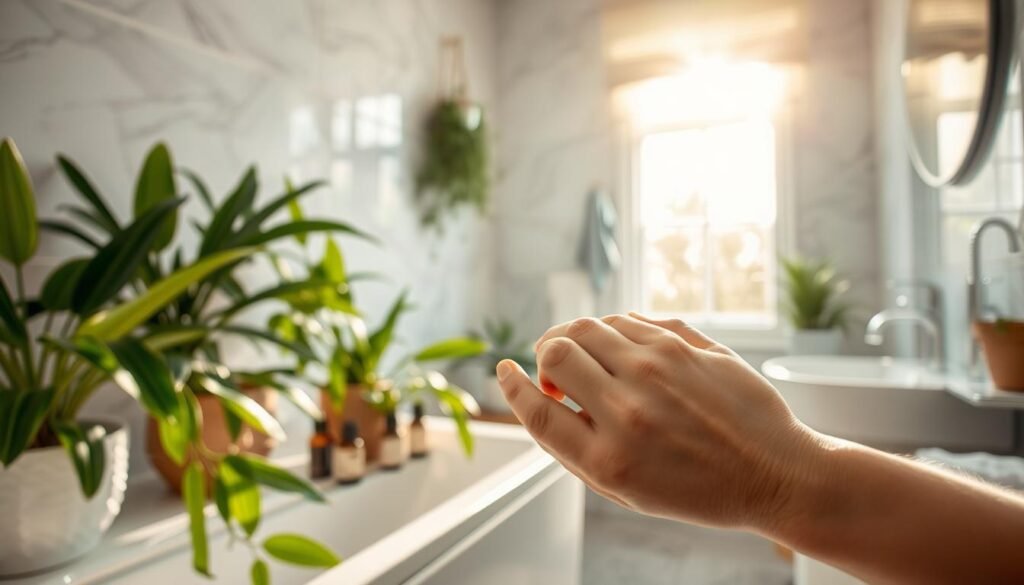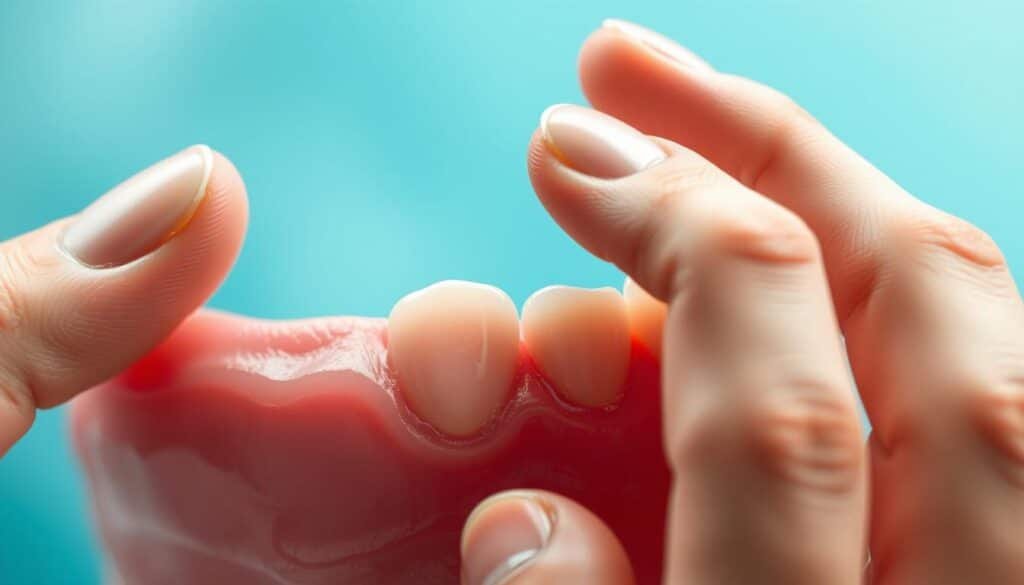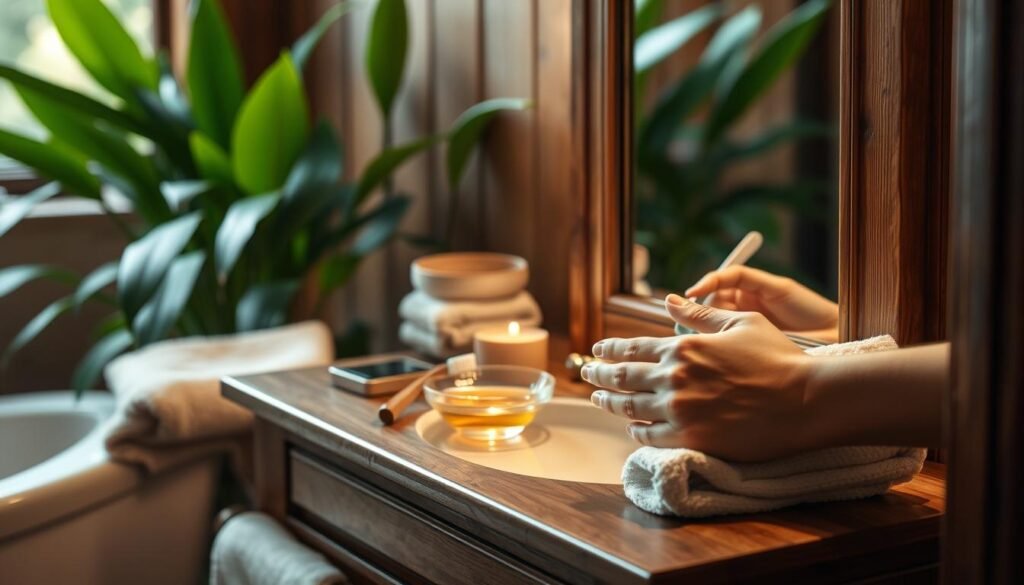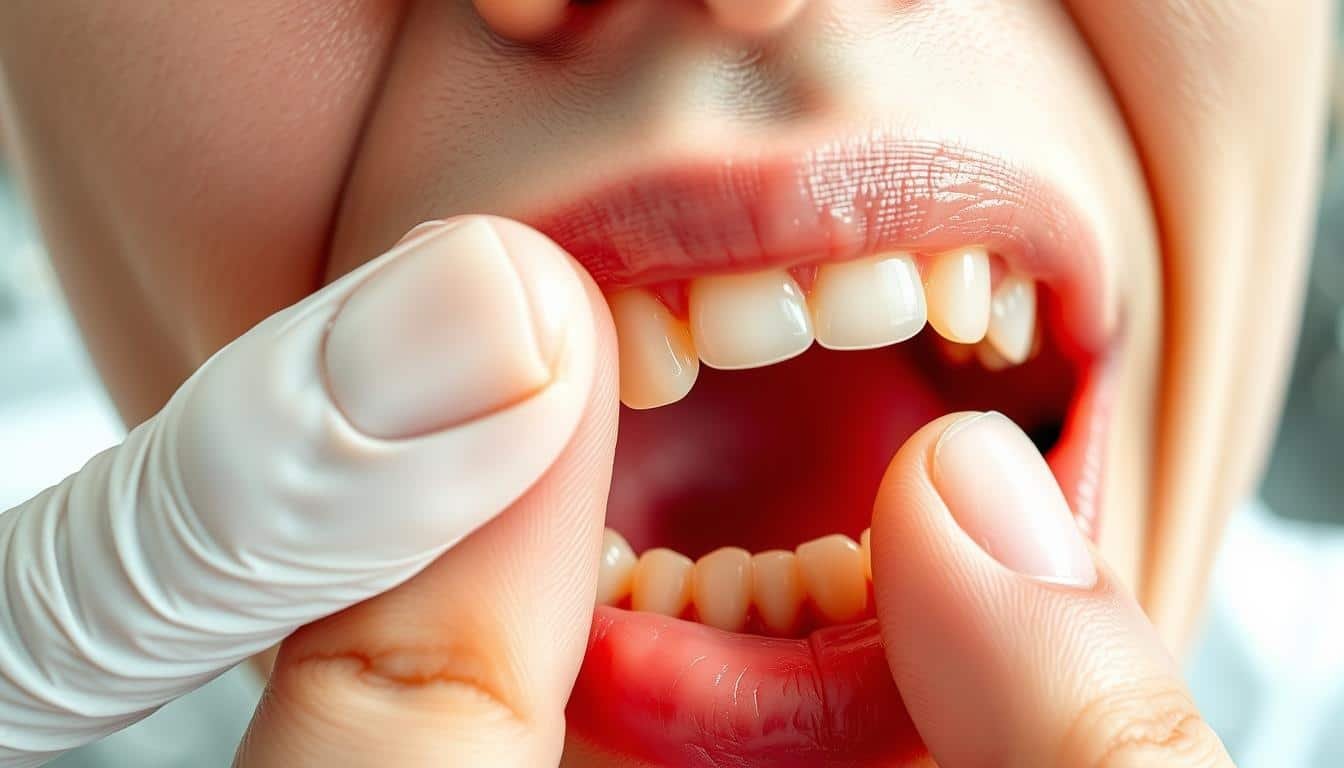Ever wondered if there’s a secret to better oral health? Gum massage might just be it. It’s a simple addition to your dental care routine. Learning how to massage your gums can greatly improve your dental health.
Gum massage does more than just add to your oral care. It boosts blood flow, reduces swelling, and strengthens tooth support. By adding this to your daily routine, you’re fighting gum disease and improving your oral health for the long term.
In this guide, I’ll cover the basics of gum massage. You’ll learn its importance and how to do it right. Whether you’re into dental care or just starting to care more about your mouth, you’ll find useful tips. Discover how this simple method can change your smile.
Key Takeaways
- Gum massage improves blood circulation and reduces inflammation
- Regular gum stimulation can prevent gum disease
- Incorporating gum massage into your daily routine enhances overall oral health
- Proper technique is crucial for effective gum massage
- Gum massage complements other oral hygiene practices for optimal dental care
Understanding the Importance of Gum Health
Gum health is key for our mouth’s overall health. Gums support our teeth and protect us from harmful bacteria. Let’s explore why gum health is important and how it affects our body.
The Role of Gums in Oral Health
Gums protect our teeth. They keep our teeth in place and cover the sensitive roots. Brushing and flossing help keep them healthy.
Consequences of Poor Gum Health
Ignoring gum care can cause big problems. Gingivitis can lead to inflammation and bleeding. If not treated, it can turn into periodontitis, causing tooth loss. So, keeping our gums healthy is crucial.
Link Between Gum Health and Overall Well-being
Our gum health affects more than just our mouth. Studies link gum disease to heart disease and diabetes. By fighting gum disease, we protect our smile and our body. Regular dental visits and good home care are essential for healthy gums and overall health.
Benefits of Regular Gum Massage

I’ve found that adding gum massage to my daily routine has changed everything. It brings many benefits. Massaging my gums has greatly improved my gum health.
One big plus is better blood flow to my gums. This flow brings important nutrients, making my gums healthier and stronger. Regular massage also cuts down on inflammation and makes my gums more resilient.
Gum massage is also great for stopping gum disease. It helps remove plaque and food bits that can get stuck. This keeps my mouth clean and healthy.
- Reduces inflammation
- Strengthens gum tissue
- Prevents gum disease
- Alleviates gingivitis symptoms
- Promotes faster healing
For those with gingivitis, gum massage is especially helpful. It has reduced swelling and bleeding for me. The massage helps my gums heal faster.
Adding gum massage to my daily routine has made a big difference. It’s easy and effective for keeping my gums and smile healthy.
Essential Tools for Gum Massage
Gum massage is a key part of a good dental care routine. I’ve found several tools that make gingival stimulation easy and effective. Let’s explore some options to boost your oral hygiene.
Specialized Gum Massagers
Rubber-tipped stimulators are great for targeted gum massage. These tools have a small, soft rubber end that’s perfect for gentle circular motions along the gumline. Some even come with textured surfaces for extra stimulation.
Using Your Toothbrush for Gum Massage
Your regular toothbrush can double as a gum massager. I prefer electric toothbrushes with soft bristles for this task. They provide consistent vibrations that stimulate gums effectively. If you use a manual brush, apply gentle pressure and move in small circles along your gums.
Natural Alternatives for Gum Stimulation
For a more natural approach, clean fingers or a soft washcloth work well. I often use my index finger to massage my gums after brushing. It’s a simple yet effective way to incorporate gum care into my oral hygiene routine.
| Tool | Pros | Cons |
|---|---|---|
| Rubber-tipped stimulator | Precise, gentle on gums | Requires separate purchase |
| Electric toothbrush | Consistent vibration, multifunctional | More expensive |
| Manual toothbrush | Affordable, readily available | Requires more effort |
| Fingers/Washcloth | Free, always accessible | Less precise, requires proper technique |
Choose a tool that feels comfortable and fits seamlessly into your oral hygiene routine. Remember, consistency is key for maintaining healthy gums.
How to Massage Gums: Step-by-Step Guide

Learning to massage your gums can greatly improve your oral health. I’ll show you a simple yet effective technique. It’s easy to add to your daily oral care routine.
First, wash your hands well. This step is important to avoid spreading harmful bacteria. Then, pick your tool. You can use a specialized gum massager or clean fingers for beginners.
Here’s how to massage your gums:
- Apply gentle pressure to your gums
- Move in small circular motions along the gumline
- Cover both outer and inner gum surfaces
- Pay extra attention to areas where gums meet teeth
- Massage each section for 30 seconds to 1 minute
Be gentle when learning to massage your gums. Too much pressure can hurt or damage them. After massaging, rinse your mouth with warm water to clean out any debris.
Adding this technique to your daily routine can make your gums healthier and your smile brighter. It’s a great oral hygiene tip for long-term dental health.
Incorporating Gum Massage into Your Daily Routine

Adding gum massage to your dental care routine can boost your oral health. I’ve seen a big difference in my gum health and overall oral hygiene by doing this. It’s a simple yet effective addition to your routine.
Best Times for Gum Massage
The best times for gum massage are after brushing and flossing. This makes sure your gums are clean and ready for the massage. I do it in the morning and before bed, fitting it into my regular oral care schedule.
Frequency and Duration of Massage Sessions
Consistency is key for gum massage. I try to do it at least once a day, but twice a day is even better. Each session lasts 2-3 minutes, giving me enough time to cover all areas of my gums.
Combining Gum Massage with Other Oral Care Practices
To get the most benefits, I mix gum massage with other oral hygiene tips. After brushing and flossing, I use an antimicrobial mouthwash, then do a gentle gum massage. This combination has greatly improved my oral health.
| Time of Day | Oral Care Routine | Duration |
|---|---|---|
| Morning | Brush, Floss, Mouthwash, Gum Massage | 5-7 minutes |
| Evening | Brush, Floss, Mouthwash, Gum Massage | 5-7 minutes |
By adding gum massage to my daily dental care routine, I’ve seen big improvements in my gum health and overall oral hygiene. It’s a simple yet effective addition to any at-home gum care regimen.
Proper Techniques for Effective Gum Stimulation
Learning the right gum massage technique is crucial for better gum health. I’ve discovered that gentle circular motions are best for stimulating gums. It’s vital to use light pressure to prevent harming the delicate gum tissue.
I concentrate on the area where my gums meet my teeth when I massage my gums. This spot often has plaque, making it essential for cleaning. For my lower gums, I use upward strokes. On my upper gums, I apply downward strokes. This helps blood flow and makes my gums healthier.
Here’s a simple guide I follow for effective gum stimulation:
- Use gentle, circular motions
- Apply light pressure
- Focus on gum-tooth junctions
- Use upward strokes for lower gums
- Apply downward strokes for upper gums
- Be thorough but gentle
- Pay attention to sensitive areas
Consistency is key in gum massage. I include it in my daily oral care routine to enjoy its benefits. By sticking to these techniques, I’ve seen a big improvement in my gum health over time.
Common Mistakes to Avoid During Gum Massage
In my quest to improve my oral hygiene tips, I’ve learned that gum massage can be a game-changer. But it’s not just about doing it; it’s about doing it right. Let’s explore some common pitfalls to sidestep in your gum massage technique.
Applying Too Much Pressure
One of the biggest mistakes in my dental care routine was using excessive force. Gentle pressure is key. Overzealous massaging can harm gum tissue and lead to recession. I aim for a touch that’s firm enough to stimulate, but not so hard that it causes discomfort.
Neglecting Certain Areas of the Mouth
I used to focus only on the easily accessible areas. Now, I make sure to massage all areas, including those tricky spots behind my back molars. A thorough approach ensures comprehensive gum health.
Using Incorrect Motions or Techniques
Sawing or aggressive back-and-forth motions were my initial go-to. I’ve since learned these can irritate gums. Instead, I use gentle circular or rolling motions in my gum massage technique. This approach stimulates without causing harm.
| Common Mistake | Correct Approach |
|---|---|
| Applying too much pressure | Use gentle, firm pressure |
| Neglecting hard-to-reach areas | Massage all areas, including behind molars |
| Aggressive sawing motions | Gentle circular or rolling motions |
| Rushing the process | Take time to massage each section thoroughly |
Remember, if you experience pain or bleeding, ease up on the pressure. If symptoms persist, it’s best to consult a dentist. By avoiding these common mistakes, you’ll maximize the benefits of gum massage in your oral hygiene routine.
Dietary Considerations for Healthy Gums
A balanced diet is key for gum health. What we eat affects our oral health a lot. It helps prevent gum disease. Here are some dietary tips for healthy gums.
First, let’s talk about what to avoid. Sugary and acidic foods cause plaque and tooth decay. Instead, eat nutrient-rich foods that help gums:
- Fruits and vegetables
- Lean proteins
- Whole grains
Vitamin C is great for gums. It helps make collagen in gum tissue. You can find it in citrus fruits and leafy greens. Also, calcium and vitamin D are important for strong teeth and bones.
Drinking water is also important for oral hygiene. It helps remove food particles and bacteria. It’s a simple yet effective tip.
Some foods have antibacterial properties that help gums. Green tea and raw onions are good examples. Adding these to your diet can help your gums.
Remember, a healthy diet is about overall health, including gums. By choosing the right foods, you’re preventing gum disease and keeping your smile healthy.
Complementary Practices for Optimal Gum Health
I’ve found that adding gum massage to other practices boosts my oral care. These methods together make a strong dental care plan. They support gum health and overall well-being.
Oil Pulling and Its Benefits
Oil pulling is an old technique that’s now popular for gum care. I swish coconut or sesame oil in my mouth for 15-20 minutes before spitting it out. It helps reduce plaque and fights gingivitis, making it a valuable part of my oral care.
Herbal Rinses for Gum Care
Herbal rinses are great for keeping gums healthy. I use rinses with chamomile or green tea to soothe my gums and fight bacteria. These natural solutions add extra protection to my dental care routine.
The Role of Hydration in Gum Health
Drinking enough water is key for gum health. I drink at least 8 glasses of water a day to help my mouth clean itself. Sometimes, I use a fluoride rinse to strengthen my teeth and prevent decay. These simple steps, along with regular gum massage, help keep my gums healthy.
FAQ
Why is gum massage important?
What tools can be used for gum massage?
How often should I massage my gums?
What is the proper technique for gum massage?
What mistakes should I avoid during gum massage?
Are there dietary considerations for healthy gums?
What other practices can complement gum massage for optimal oral health?
Source Links
- Effective Gum Care: Brushing & Flossing Tips | Blog – Feno – https://feno.co/blogs/gum-health/brushing-flossing-techniques-for-gum-health?srsltid=AfmBOoowIu8qkmfw–VxH6ikmIBMC-rfsrJK1l0ylSigKfCVb1fMScmg
- Oral Health Unveiled: The Secret Habits of People Who Swear by Dental Guards – https://clearcomfortnightguards.com/blogs/blog/oral-health-unveiled-the-secret-habits-of-people-who-swear-by-dental-guards?srsltid=AfmBOopOnkfxRkiJRtEoWJw13cuWUd5JHl_0tHGHt0UvxNT9nq-RKfHt
- Tips and Tricks for Maintaining Healthy Gums – https://www.grandvilledental.com/tips-and-tricks-for-maintaining-healthy-gums/













5 Comments
Interesting read! But arent we missing the role of diet in gum health? Surely, sugar intake and nutrition play a part too, right?
Interesting read! But, is gum massage really effective for all ages or are there specific age groups that benefit more?
Isnt it ironic that were so obsessed with teeth whitening but often overlook gum health? Lets give gums the care they deserve.
Isnt it fascinating how gum health is so integral yet easily overlooked? I wonder how many of us actually practice gum massage at home?
Interesting read! But is gum massage really a game-changer or just another fad in the oral healthcare industry? 🤔 #OpenForDebate